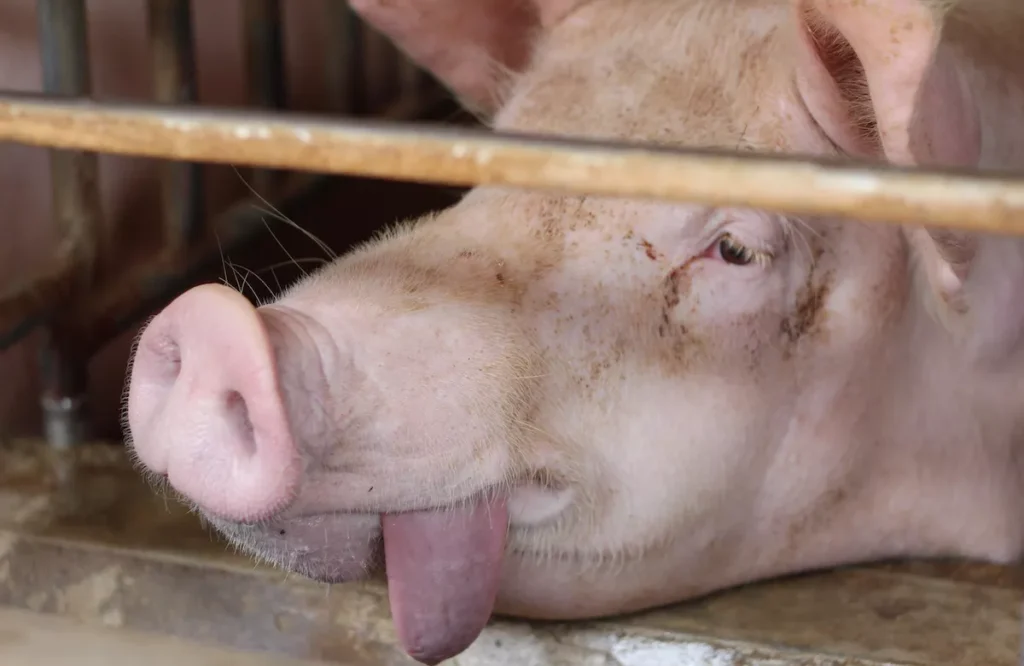The state continues to unreasonably delay full implementation of a law passed by voters five years ago
Washington, D.C. — Animal Wellness Action, the Animal Wellness Foundation, and the Center for a Humane Economy sharply criticized California’s decision to enter into a courtroom agreement with the state’s pork retailers to further delay for six months the full implementation and enforcement of Proposition 12 — a ballot measure passed by state voters in 2018 that prohibits the in-state sale of pork from cruelly confined pig operations, whether raised inside or outside of California.
“Prop 12 is unambiguous: pork sold in the state after the effective date must not come from operations that severely confine sows in gestation crates,” said Wayne Pacelle, president of Animal Wellness Action and an architect of the ballot measure. “Backroom deals between private entities who opposed the ballot measure and a government agency that’s been dragging its feet on enforcement are not proper and undermine the will of the people.”
Animal Wellness Action and its allied organizations today call for these actions:
- For the state Department of Food and Agriculture (CDFA) to make a statement that the legal agreement does not allow newly produced pork from extreme confinement to be sold in California after July 1.
- For food retailers in the state to honor the law and cease sales of pork raised under the inhumane conditions that Prop 12 was enacted to confront.

Prop 12, which voters approved in November 2018 in a landslide vote, was to be in full effect on Jan. 1, 2022. Legal maneuvering by the pork industry resulted in delayed enforcement, but those appeals have been exhausted. The U.S. Supreme Court upheld the ballot measure as a proper exercise of state authority in early May.
The legal agreement announced yesterday is sufficiently vague and is being liberally interpreted by the leading opponent of Prop 12, the National Pork Producers Council, as giving producers license to continue to sell pork that comes from extreme confinement operations relying on gestation crates.
“It is not unreasonable for pork already in commerce to be sold in California and consumed rather than wasted,” added Mr. Pacelle. “But the state must not allow newly reared pigs coming from extreme confinement systems to be slaughtered and sold in California. California voters decided to halt that kind of commerce and the U.S. Supreme Court agreed that those restrictions were constitutionally sound.”
The agreement between the NPPC and other private parties and the CDFA seems to suggest it is okay for non-Prop 12 compliant pork to be sold in the state through December 2023. Animal Wellness Action and its allied organizations today urge the CDFA to make a statement that the legal agreement does not allow newly produced pork from extreme confinement to be sold in California after July 1.
The state’s latest dilatory actions continue a long pattern of unnecessary Prop 12 avoidance and delay. The state Department of Food and Agriculture (CDFA) dragged its feet for years on drafting and finalizing the regulations required to implement Prop 12. Those regulations were only finalized after Animal Wellness Action and the Center filed a legal challenge to the inadequate drafts being proposed. CDFA’s delay allowed for the retailers in the state to bring the legal action that resulted in this latest courtroom capitulation that will allow the sale of pork from cruel confinement operations to continue.
“Despite the last roadblock to implementation being removed, we face yet another surrender by the state to the industry that means that now, a full five years after Prop 12 was passed, pork from cruelly confined pigs will still be available on supermarket shelves and in restaurants throughout California,” said Scott Edwards, general counsel of Animal Wellness Action and the Center for a Humane Economy. “It’s an outrage that state officials are bowing to an industry that’s dragged them through the courts for years instead of working to fully implement the law duly and democratically enacted by the people of California.”
In addition to demanding that the state take immediate steps to ensure that no more non-complaint pork products find their way into the state stock of supplies, the groups are also calling on retailers in the state to honor the law and cease sales of pork raised under the inhumane conditions that Prop 12 was enacted to confront.
The industry has responded to the Supreme Court’s ruling in favor of California by turning to Congress and seeking to overturn Prop 12 through that channel. The NPPC engineered the introduction of the Exposing Agriculture Trade Suppression (EATS) Act. The bill would strip away the rights of states to enact any laws that have an impact, no matter how insignificant, on agricultural operations in other states. While the Act was introduced specifically to undercut the recent Supreme Court decision upholding California’s Prop 12, the bill also threatens many hundreds of state laws enacted to protect animal welfare, public and environmental health, and consumer safety by setting up a federal preemption scheme that is in direct conflict with the rights granted to states under the 10th Amendment.


